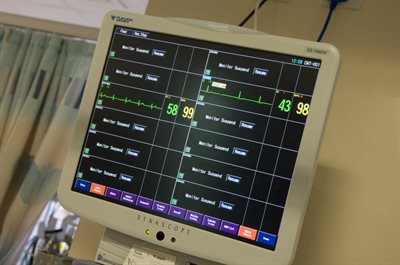UK heart surgery among the best in the world with improvements saving hundreds of lives

Heart monitor at Northampton General Hospital's Heart Centre
Heart surgery in the UK is among the best in the world, with improvements in care saving hundreds of extra lives in recent years, an independent report has found.
NICOR produced the annual report into the safety and clinical effectiveness of cardiovascular services and patient outcomes in England and Wales, for services covered by the National Clinical Audit Programme.
The report suggests recommendations for improvement and NHS England are already on track and delivering on many of these areas through the hard work of NHS staff.
In the UK, over 7 years of the audit, around 450 lives have been saved as a result of switching to more modern techniques for angioplasty.
Professor Huon Gray, National Clinical Director for Heart Disease at NHS England, said: “We welcome the National Institute for Cardiovascular Outcomes Research’s audits which provide some of the most comprehensive national cardiac data available. Their findings play an important part in providing assurance that services to cardiac patients are amongst the best in the world, and importantly ensuring we focus on areas where further improvements can be made.”
With improvements to earlier diagnosis, now more than 4 in 10 children with congenital heart disease requiring a surgical or interventional treatment during infancy are diagnosed antenatally. UK waiting times for cardiovascular care are also improving, with elective cardiac surgery waiting times down from 105 days to 96 days from 2014/15 to 2016/17. In addition, heart failure outcomes are improving as a result of access to specialist care, drugs and rehabilitation, with overall in-hospital mortality falling to under 10% in 2016/17.
However, NHS England recognises there are still areas for improvement and is committed to improving the lives of patients and making the NHS the safest health service in the world.
For patients who have heart attacks, where outcomes are so closely related to speed of access to treatment, the call-to-door time has increased over the past three years by six minutes. To address this and the rise in ambulance waiting times across in England, the Ambulance Response Programme was rolled out with the aim of reaching the sickest patients first to ensure they receive the fastest response as well as ending unacceptably long waits by ensuring that resources are distributed equally amongst all patients.
NHS England has published expected standards for the optimal number of surgical procedures performed by individual surgeons and congenital heart disease centres, however not all centres currently meet these standards. NHS England’s Board has agreed plans to achieve these standards for congenital heart disease services and the implementation of the standards is being led by NHS England’s regional teams.
Posted on Friday 23rd November 2018